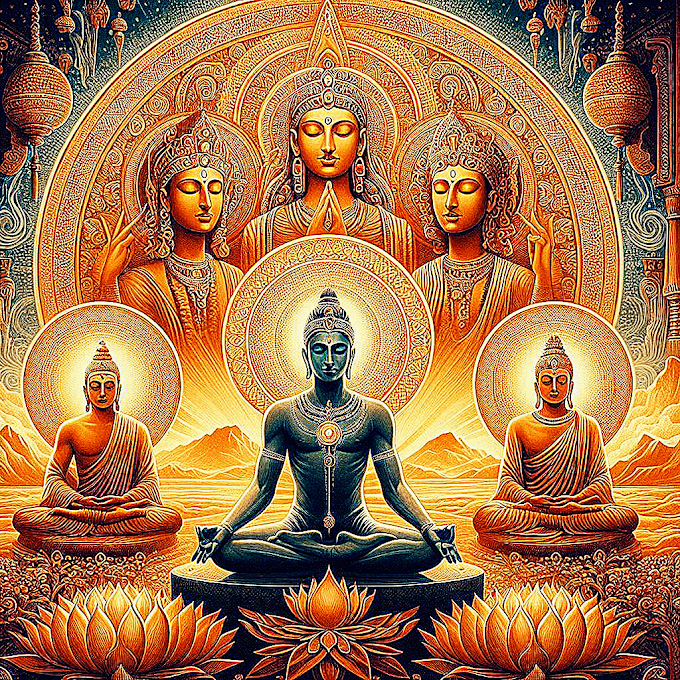Maa Sarada redefined yoga as daily devotion, patience, and mantra practice—empowering householders and women with a path to spiritual liberation.
 |
| Contribution of Maa Sarada in Yoga |
Maa Sarada’s Yogic Legacy for Daily Spiritual Life
Introduction to Maa Sarada’s Spiritual Role: A Living Embodiment of Yogic Integration
Yogic Integration in Everyday Life
In the Yoga Sutras of Patanjali, the eight limbs of Ashtanga Yoga—Yama, Niyama, Asana, Pranayama, Pratyahara, Dharana, Dhyana, and Samadhi—are often viewed as a sequential path toward liberation. However, Maa Sarada’s life exemplified a simultaneous embodiment of these principles:- Yama & Niyama: Her life was a testament to ahimsa (nonviolence), satya (truthfulness), and shaucha (purity). She forgave even those who wronged her, saying, “If you want peace, do not find fault with others.”
- Asana & Pranayama: Though not formalized in postural practice, her physical discipline and breath-centered awareness during chores reflected a natural yogic rhythm.
- Pratyahara & Dharana: Her ability to withdraw from external distractions and focus on divine remembrance—even while serving food or sweeping—was profound.
- Dhyana & Samadhi: Witnesses described her entering deep meditative states spontaneously, her gaze fixed in inner absorption, radiating serenity.
Textual References: Echoes of the Divine Feminine
Maa Sarada’s spiritual role finds resonance in ancient texts:
- In the Devi Mahatmya, the Divine Mother is described as both fierce and nurturing—qualities Sarada Devi embodied with grace.
- In the Bhagavad Gita, Chapter 12 extols the virtues of the bhakta who is “friendly and compassionate,” “content and self-controlled”—a perfect description of her demeanor.
- In Yoga Vasistha, the sage teaches that liberation is possible even in household life if one lives with detachment and awareness. Maa Sarada’s life was a living commentary on this truth.
Scientific Parallels: Neuroscience of Compassion and Focus
Modern science offers compelling insights into the spiritual qualities Maa Sarada embodied:- Compassion and caregiving activate the anterior cingulate cortex and insula—regions associated with empathy and emotional regulation. Her constant service and maternal love likely cultivated these neural pathways.
- Mindfulness and focused attention, akin to Dharana and Dhyana, enhance prefrontal cortex function, improving clarity and reducing stress. Her ability to remain centered amidst chaos reflects this neuroplastic resilience.
- Altruism and forgiveness, central to her teachings, are linked to increased oxytocin and reduced cortisol, promoting both physical and emotional healing.
READ MORE: Dharana in Ashtanga Yoga: Vibhuti & Kaivalya Insights
A Yogic Archetype Beyond Renunciation
Unlike traditional yogic models that emphasize withdrawal from worldly life, Maa Sarada offered a householder’s path to liberation. She cooked, cleaned, counseled, and meditated—not in isolation, but in the heart of community. Her teachings and example dismantled the false dichotomy between spiritual and secular, showing that every act, when done with devotion and awareness, becomes yoga.
Her famous saying, “I am the mother of the wicked as I am the mother of the virtuous,” reflects the non-dual compassion of Advaita Vedanta, where all beings are seen as manifestations of the same divine essence.Maa Sarada’s Vision of Yoga
Maa Sarada Devi’s perspective on yoga was deeply rooted in Vedantic and Tantric principles, combined with her own experiential wisdom. Her contributions can be categorized into the following areas:A. Bhakti Yoga (The Path of Devotion)
Maa Sarada emphasized devotion as a cornerstone of spiritual practice. For her:- Love as Worship: She taught that devotion to the divine and selfless love for others were inseparable. She exemplified this by nurturing all beings with a motherly affection, treating every soul as her child.
- Daily Life as Yoga: Through simple acts of love and care, she demonstrated that even mundane tasks could become a form of yoga if performed with devotion and mindfulness.
B. Karma Yoga (The Path of Selfless Action)
Maa Sarada’s life was a testament to selfless service:
- Service to Humanity: She viewed serving others as serving God. Her tireless work for devotees and visitors, irrespective of caste, creed, or gender, set an example of how karma yoga could manifest in real life.
- Detachment in Action: While she performed her duties with dedication, she remained unattached to the fruits of her actions, reflecting the essence of karma yoga as described in the Bhagavad Gita.
C. Jnana Yoga (The Path of Knowledge)
Although Maa Sarada spoke little about philosophical concepts, her insights revealed the profound knowledge of non-dualism:
- Oneness with the Divine: She saw the divine in all beings and situations, embodying the highest realization of Advaita Vedanta (non-dualism).
- Simplified Wisdom: Her teachings focused on practical aspects of jnana yoga, encouraging seekers to detach from worldly illusions and focus on the ultimate truth.
D. Raja Yoga (The Path of Mind Control and Meditation)
Maa Sarada subtly encouraged meditation and mental discipline:
- Silent Influence: She inspired her devotees to meditate and reflect on their inner selves through her own calm and meditative presence.
- Balance Between Mind and Heart: Her approach combined mental clarity with emotional devotion, offering a balanced path for householders and renunciates alike.
Maa Sarada’s Practical Contributions to Yoga
A. Yoga for Householders: Spirituality in the Flow of Daily Life
🔹 Spirituality in Daily Life
She taught that simple acts of kindness, devotion, and moral living were not lesser forms of yoga but its very essence. Her life echoed the Bhagavad Gita’s teaching (Chapter 3, Verse 19):
“One who performs duty without attachment attains the Supreme.”
Whether she was sweeping the courtyard or serving food, her actions were infused with mindfulness and devotion—what modern psychology calls “flow states”, where attention and intention merge.🔹 Patience and Forbearance as Yogic Virtues
Sarada Devi often said, “One must bear with others; without forbearance, there is no spiritual life.” This aligns with Patanjali’s Yamas—especially Ahimsa (non-violence) and Kshama (forbearance).Scientific studies show that emotional regulation and patience activate the prefrontal cortex and reduce amygdala reactivity, promoting inner peace and resilience. Her emphasis on tolerance within family life mirrors the yogic ideal of equanimity (samatvam).
B. Yoga and Women’s Empowerment: Spiritual Equality and Inclusion
Maa Sarada was a quiet revolutionary in the realm of gender and spirituality. In a time when women were often excluded from formal spiritual discourse, she became a guru, guide, and liberator.🔹 Role Model of Spiritual Attainment
She was recognized by Sri Ramakrishna as the embodiment of the Divine Mother and a realized soul. Her spiritual stature challenged patriarchal norms and inspired generations of women to pursue inner awakening.Her life resonates with the Shakta tradition, where the feminine is seen as the source of wisdom and liberation. In texts like the Tripura Rahasya, the goddess is the teacher of even the gods—a truth Sarada Devi quietly lived.
🔹 Inclusive Yoga for Women
She encouraged women to engage in Japa, meditation, and devotional service, even while fulfilling household duties. Her message was clear: spirituality is not gendered.
Modern research in contemplative neuroscience shows that women practicing mindfulness and mantra meditation experience enhanced emotional resilience, reduced stress, and improved cognitive function—validating her intuitive guidance.
Modern research in contemplative neuroscience shows that women practicing mindfulness and mantra meditation experience enhanced emotional resilience, reduced stress, and improved cognitive function—validating her intuitive guidance.
C. Simplifying Spiritual Practices: Accessible Paths to Inner Peace
Maa Sarada’s genius lay in demystifying yoga. She stripped away ritual complexity and emphasized direct, heartfelt connection with the Divine.🔹 Japa (Chanting of Mantras)
She often advised devotees: “Repeat the name of God. That will bring everything.” This aligns with Mantra Yoga, where repetition of sacred sounds calms the mind and purifies consciousness.Scientific studies on mantra repetition (e.g., Om, Ram, or So’ham) show:
- Reduced heart rate and blood pressure
- Increased alpha brain waves (relaxation)
- Enhanced focus and emotional stability
Her emphasis on Japa made yoga portable—a practice that could be done while walking, cooking, or resting.
🔹 Faith and Surrender
Sarada Devi taught that unwavering faith and surrender were sufficient for spiritual growth. She said, “If you cannot do anything else, just remember God.”
This echoes the Bhakti Yoga tradition and the Gita’s assurance (Chapter 18, Verse 66):
A Living Yoga for All
Maa Sarada Devi’s practical contributions to yoga are not confined to historical reverence—they are living tools for modern seekers. She offered a universal path where:- Every action becomes sacred through intention
- Every woman becomes a spiritual aspirant
- Every household becomes a temple
Key Teachings Relevant to Yoga
A. The Mind as the Key to Liberation
Maa Sarada often spoke about the importance of controlling the mind. She believed that a disciplined mind was essential for spiritual progress and urged her followers to:
- Engage in regular meditation and prayer.
- Cultivate positive thoughts and avoid negativity.
B. Love and Compassion as Core Practices
She taught that love and compassion were not just virtues but powerful yogic practices. By serving others with genuine affection, individuals could purify their hearts and connect with the divine.
C. Purity and Simplicity
Maa Sarada stressed the importance of inner and outer purity. She encouraged a life of simplicity, free from unnecessary desires, as a foundation for yogic living.
Maa Sarada’s Influence on Yogic Movements
A. Ramakrishna Mission
Maa Sarada played a crucial role in inspiring the formation of the Ramakrishna Mission, which integrated yoga into its educational and humanitarian work. The mission’s focus on service reflects her teachings on karma yoga.
B. Spiritual Guidance
As the spiritual guide of many prominent disciples, including Swami Vivekananda, Maa Sarada influenced the global spread of yoga. Her teachings on compassion, tolerance, and inclusivity continue to inspire yogic practitioners worldwide.
Relevance of Maa Sarada’s Contributions Today
A. Bridging Spirituality and Practicality
In a world increasingly dominated by materialism, Maa Sarada’s approach to yoga offers a practical path for integrating spirituality into daily life.
B. Empowering Individuals
Her emphasis on selfless service and inner discipline empowers individuals to find purpose and peace, regardless of their external circumstances.
C. Universal Motherhood
Her universal love and compassion resonate with the global need for unity and harmony, making her teachings timeless and relevant.
Conclusion
Maa Sarada Devi’s contribution to yoga lies in her ability to make it accessible, practical, and universal. By embodying the principles of devotion, selfless action, and wisdom, she demonstrated that yoga is not confined to physical postures or esoteric practices but is a way of life that nurtures love, peace, and harmony. Her legacy continues to inspire millions, offering a holistic vision of yoga that transcends barriers and enriches the human spirit.
Resources
- IJRTSSH Journal (2025): Explores Maa Sarada’s role in integrating yoga with household life and shaping Vivekananda’s inclusive spiritual vision.
- IJCRT Research Paper (2024): Analyzes her spiritual mentorship and emphasis on japa, tolerance, and simplified yogic practices.
- The Civil India Profile: Highlights her embodiment of Bhakti Yoga and practical Vedanta through daily acts of devotion and compassion.
- Ramakrishna Mission Archives: Document her teachings on mantra repetition, forbearance, and spiritual equality for women.
- Swami Tapasyananda’s Biography: Offers insights into her silent sadhana and yogic depth beyond formal renunciation.

.png)



.png)


.png)
